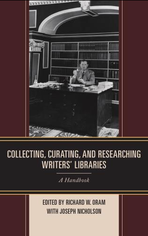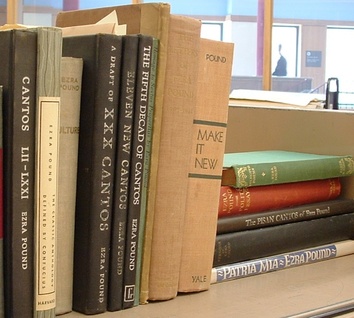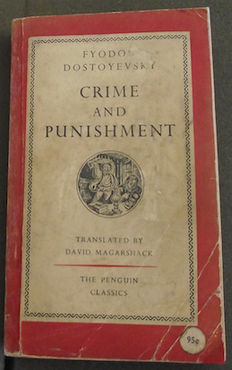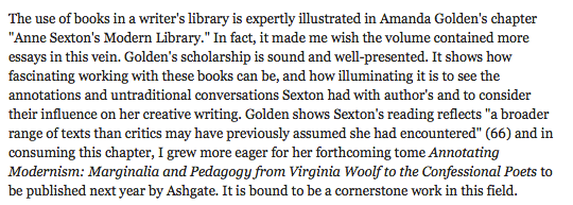 Peter Steinberg has reviewed Richard Oram and Joseph Nicholson's Collecting, Curating, and Researching Writers' Libraries: A Handbook (2014), which contains my essay, "Anne Sexton's Modern Library." You can read his full review here. Below is his thoughtful response to my piece.
0 Comments
 My article "John Berryman at Midcentury: Annotating Ezra Pound and Teaching Modernism" has been published in Modernism/Modernity and is available on Project Muse. It begins with Berryman's annotations in his personal copies of Pound's poetry while preparing an edition of Pound's Selected Poems in order to examine the ways that his approach to teaching modernism in Humanities courses at the University of Minnesota from mid-fifties through the mid-sixties was Poundian in its comprehensiveness. This article is part of a longer chapter in my book, Annotating Modernism: Marginalia and Pedagogy from Virginia Woolf to the Confessional Poets (Ashgate, 2015), and it is the first treatment of Berryman's annotating strategies alongside his teaching materials. This article considers books in Berryman's personal library and his teaching notes at Minnesota as well as the Classicist Van Meter Ames's transcriptions of Berryman's modern poetry lectures at the University of Cincinnati in 1952, which are part of John Haffenden's Papers at Columbia University. The image to the left is of Berryman's Pound books from his library at Minnesota. I discuss these volumes in greater detail in Annotating Modernism. "Evidence for Pedagogy: Sylvia Plath and Ted Hughes Annotating Crime and Punishment" at MLA 20154/1/2014  Emory Manuscript, Archives, and Rare Book Library Emory Manuscript, Archives, and Rare Book Library I will be presenting "Evidence for Pedagogy: Sylvia Plath and Ted Hughes Annotating Crime and Punishment" on the International Dostoevsky Society's panel, "New Approaches to Crime and Punishment," organized by Susan McReynolds (Northwestern University) at the 2015 Modern Language Association Convention in Vancouver, B.C. Further treatment of Plath and Hughes's marginalia and teaching will be in my forthcoming book Annotating Modernism: Marginalia and Pedgagogy from Virginia Woolf to the Confessional Poets (Ashgate 2015). Here is a brief abstract of my talk: While she was teaching first year English at Smith College in 1958, Sylvia Plath annotated a Penguin paperback copy of Fyodor Dostoevsky’s Crime and Punishment (1866), which she then handed to her husband Ted Hughes to use when he taught the novel in his Great Books course at the University of Massachusetts, Amherst. This copy of Crime and Punishment, housed with Hughes's library at Emory University, records their pedagogical engagement with the novel and its midcentury critical reception. As a reader, Hughes did not share Plath’s tendency to annotate his books and his response may have even surprised Plath. When her classmate at Newnham College had the audacity to add notes in pencil to one of the books Plath had annotated, she was outraged, “feeling my children had been raped, or beaten by an alien” (Unabridged Journals of Sylvia Plath 226). Hughes proceeded to fill the entire novel with his own notes in black ink, pencil, and sometimes red pencil. In order to be thorough, at times he repeated points Plath had made or, in at least one instance, he underlined her comments and added his own. While Plath’s annotations engage midcentury critical interpretations of the text, Hughes’s notes suggest his adaptation of academic practices for his own purposes. As he made his way through the novel, Hughes wrote in available spaces, often adding brief remarks above Plath’s underlining and at the top of pages. The practicality of Hughes’s annotations provided a form of shorthand for teaching that also speaks to his approach to poetry. While Hughes desired to maintain his distance from academia throughout the rest of his career, this copy of Crime and Punishment records some of the ways that his interpretation of language, literature, and pedagogy existed in close proximity to Plath's marginalia and the critical contexts informing it. |

